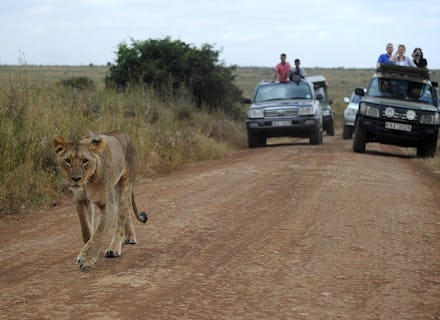It Just Got Harder for Hunters to Bring Lion Trophies Into the US — Here's Why

Justice for Cecil: Nearly five months after the African lion was shot by Minnesota dentist Walter Palmer in a Zimbabwean park, President Barack Obama's administration has expanded the Endangered Species Act to cover two lion subspecies, the Associated Press reported Monday.
The addition isn't a direct result of Cecil's death, the AP stressed, but rather "a redoubling of efforts to ensure that violators of wildlife laws don't reap future benefits from importing wildlife and wildlife products." According to Vice News, the United States Fish and Wildlife Service has placed several hurdles in hunters' way, which it hopes will make importing trophy lions "virtually impossible."
"The sea change moment here is the service is going to require that for a permit to be issued, that it's shown that trophy hunting is a benefit to lion populations," Luke Hunter, the zoologist who heads Panthera, a big cat conservation group, told Vice. "I think that's a really significant step.
According to the Fish and Wildlife Service's news release, the two species brought under the protection of the Act are P.l. leo, which is most closely related to the Asiatic lion and inhabits western and central Africa, and P.l. melanochaita, which dwells in southern and eastern Africa. Some 1,400 individuals of the P.l. leo subspecies remain — 900 in Africa and 523 in India — qualifying it as endangered; the P.l. melanochaita population is faring slightly better, at about 17,000 to 19,000; it has been classified as a threatened species.
Why are lions dying off? Vice reported that there were around half a million lions living in Africa at the dawn of the 20th century; the number of trophies taken home by American hunters in the past decade has been estimated at 5,600. Hunting isn't the only factor responsible for the drop in Africa's lion population: Loss of habitat and prey, retaliation killings by humans, insufficient regulations and poor oversight of preserves are among the factors that led to the lion's decline.
The problem with poaching: Certainly, poor policing of regulations and wildlife preserves means fertile ground for poaching, but hunting itself shouldn't spell the end of the African lion. "Sport-hunting, if well managed, may provide a benefit to the subspecies," the Service said. "Well-managed conservation programs use trophy hunting revenues to sustain lion conservation, research and anti-poaching activities. However, the Service found that not all trophy hunting programs are scientifically based or managed in a sustainable way."
The program that sanctioned Palmer's kill, Bushman Safaris, now faces criminal poaching charges in Zimbabwe.
"The Fish and Wildlife Service will have to make 'a clear and unequivocal determination' that hunting permits support a well-managed national conservation program in the country where the hunt will take place," Vice reported. The Service's director, Dan Ashe, tendered a Director's Order that will make it much harder to obtain a permit, and will limit what a permit allows hunters to do.
The solution: People looking to import trophies and products made from these endangered species, like skin and paws, can count on "a much higher burden than they have in the past," Ashe said Monday. According to Vice, France and Australia are among the countries that have barred imported lion trophies, with the U.K. considering a similar measure by 2017. A number of commercial airlines banned the transport of animal trophies following Cecil's death.
"The lion is one of the planet's most beloved species and an irreplaceable part of our shared global heritage," Ashe said in the news release. "If we want to ensure that healthy lion populations continue to roam the African savannas and forests of India, it's up to all of us — not just the people of Africa and India — to take action."